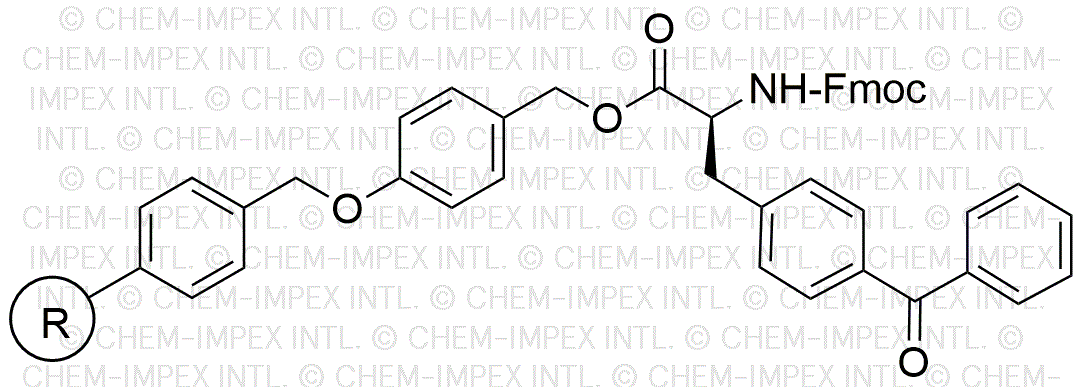Fmoc-L-4-benzoyl-L-phenylalanine 4-alkoxybenzyl alcohol resin is widely utilized in research focused on:
- Peptide Synthesis: This compound serves as a key building block in solid-phase peptide synthesis, allowing researchers to create complex peptides efficiently.
- Drug Development: It is used in the development of pharmaceutical compounds, particularly in the design of peptide-based drugs that target specific biological pathways.
- Bioconjugation: The resin facilitates the attachment of peptides to various biomolecules, enhancing the efficacy of therapeutic agents in targeted drug delivery systems.
- Material Science: This compound is applied in the creation of functionalized materials, which can be used in sensors or drug delivery systems due to its unique chemical properties.
- Research and Development: It supports academic and industrial research by providing a versatile platform for studying peptide interactions and modifications, leading to advancements in biochemistry and molecular biology.
General Information
Properties
Safety and Regulations
Applications
Fmoc-L-4-benzoyl-L-phenylalanine 4-alkoxybenzyl alcohol resin is widely utilized in research focused on:
- Peptide Synthesis: This compound serves as a key building block in solid-phase peptide synthesis, allowing researchers to create complex peptides efficiently.
- Drug Development: It is used in the development of pharmaceutical compounds, particularly in the design of peptide-based drugs that target specific biological pathways.
- Bioconjugation: The resin facilitates the attachment of peptides to various biomolecules, enhancing the efficacy of therapeutic agents in targeted drug delivery systems.
- Material Science: This compound is applied in the creation of functionalized materials, which can be used in sensors or drug delivery systems due to its unique chemical properties.
- Research and Development: It supports academic and industrial research by providing a versatile platform for studying peptide interactions and modifications, leading to advancements in biochemistry and molecular biology.
Documents
Safety Data Sheets (SDS)
The SDS provides comprehensive safety information on handling, storage, and disposal of the product.
Product Specification (PS)
The PS provides a comprehensive breakdown of the product’s properties, including chemical composition, physical state, purity, and storage requirements. It also details acceptable quality ranges and the product's intended applications.
Certificates of Analysis (COA)
Search for Certificates of Analysis (COA) by entering the products Lot Number. Lot and Batch Numbers can be found on a product’s label following the words ‘Lot’ or ‘Batch’.
Numéro de catalogue
Numéro de lot/série
Certificates Of Origin (COO)
This COO confirms the country where the product was manufactured, and also details the materials and components used in it and whether it is derived from natural, synthetic, or other specific sources. This certificate may be required for customs, trade, and regulatory compliance.
Numéro de catalogue
Numéro de lot/série
Safety Data Sheets (SDS)
The SDS provides comprehensive safety information on handling, storage, and disposal of the product.
DownloadProduct Specification (PS)
The PS provides a comprehensive breakdown of the product’s properties, including chemical composition, physical state, purity, and storage requirements. It also details acceptable quality ranges and the product's intended applications.
DownloadCertificates of Analysis (COA)
Search for Certificates of Analysis (COA) by entering the products Lot Number. Lot and Batch Numbers can be found on a product’s label following the words ‘Lot’ or ‘Batch’.
Numéro de catalogue
Numéro de lot/série
Certificates Of Origin (COO)
This COO confirms the country where the product was manufactured, and also details the materials and components used in it and whether it is derived from natural, synthetic, or other specific sources. This certificate may be required for customs, trade, and regulatory compliance.

